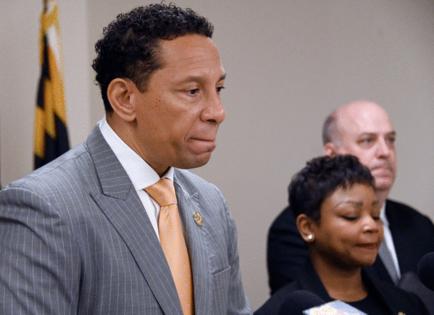Baltimore County officer facing misconduct charges testifies at fellow officer's pepper-spraying trial
Published in News & Features
BALTIMORE — On the second day of Zachary Small’s trial for pepper-spraying an arrestee, a fellow county officer facing related criminal charges testified briefly against him.
Baltimore Circuit Judge Paul E. Alpert ruled Wednesday morning that Baltimore County officer Thomas Desmond, set to stand trial in December for a misconduct in office charge related to the same arrest, could be ordered to answer a single question on the witness stand.
A Baltimore City grand jury indicted Small on charges including second-degree assault, reckless endangerment and misconduct in office stemming from his treatment of an armed robbery suspect arrested on Sept. 27, 2023 after escaping from police custody at Johns Hopkins Hospital.
After the 32-year-old man was handcuffed, shackled and seatbelted in a police SUV, he complained that the car was too hot. He begged officers to lower a window so he could breathe while banging on the door to get their attention. Small pepper-sprayed him in the face several times, then later dragged him to the ground and lifted him up by his hair, body-camera video shows.
“What if any, fears or concerns did you have about [the armed robbery suspect] during the arrest?” Assistant State’s Attorney Kimberly Rothwell asked Desmond.
“I don’t think I had any that day,” Desmond replied. “I was just trying to process the scene.”
In addition to Desmond, two other county officers face city charges of misconduct in office related to the same arrest. Justin Graham-Moore and Jacob Roos are both accused of failing to intervene.
Because defendants have the constitutional right against self-incrimination, Desmond received limited immunity in exchange for being called to testify. Prosecutors cannot use his Wednesday testimony against him in his own trial.
A similar question arose in the case of Baltimore Police Officer William Porter, who the Maryland Supreme Court ruled prosecutors could compel to testify against his co-defendant officers charged in the arrest and death of Freddie Gray.
Before Alpert agreed to have Desmond offered limited testimony, Desmond’s attorney Granville Templeton III told the judge that his client was a new officer at the time and that prosecutors didn’t require his perspective.
But Rothwell argued Desmond’s was necessary as a witness because he could describe the threat that he perceived from the detainee during his arrest.
Under state law and police department policy governing officers’ use of force, police can only use “necessary and proportional” force against a person to “prevent an imminent threat of physical injury to a person” or “effectuate a legitimate law enforcement objective.”
Defense attorneys for Small have cited the 1989 U.S. Supreme Court case Graham v. Connor, which determined juries and judges should evaluate officers’ use of force based on the “perspective of a reasonable officer on the scene, rather than the 20/20 vision of hindsight.” Rothwell also argued Desmond could provide such a perspective.
City prosecutors have contended that Small’s use of force during the arrest was excessive and illegal.
Meanwhile, Small’s attorneys Brian Thompson and Patrick Seidel have argued that their client’s treatment of the man who sprinted away from officers before Baltimore Police recaptured him minutes later was a legitimate method to subdue an unruly suspect who posed a flight risk.
The trial will continue Thursday. Former Baltimore County Maj. Orlando Lilly, now the superintendent of the Maryland Natural Resources Police, is expected to testify before prosecutors rest their case.
-------
©2024 The Baltimore Sun. Visit at baltimoresun.com. Distributed by Tribune Content Agency, LLC.







Comments